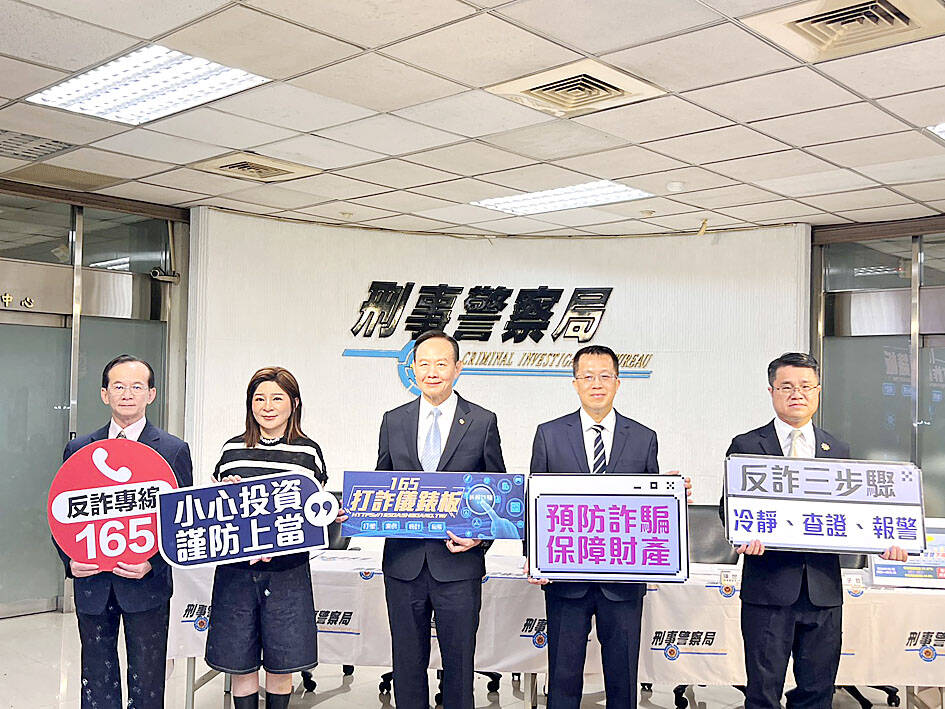Scam tactics have evolved, despite a decrease in the number of reported cases over the past year, with scammers repeatedly targeting flood relief efforts, the National Police Agency’s Criminal Investigation Bureau said yesterday.
Scam rings were using fake fundraisers to swindle people who wanted to aid the disaster relief efforts in Hualien County, after a barrier lake in the Mataian River (馬太鞍溪) overflowed and swept into Guangfu Township (光復), the bureau said.
People who want to donate money or supplies, or join rescue efforts, should follow official procedures, the bureau said, cautioning people against clicking suspicious links or believing strange messages.

Photo copied by Yao Yueh-hung, Taipei Times
Scams related to disaster relief efforts are different from other scams, which often lure people with the promise of high returns, it said, adding that relief effort scams exploited people’s empathy to lower their guard, and offered thank-you rewards, altruistic statements or public welfare engagement as bait.
For example, a scam ring posted on social media that it was providing free rain boots for volunteers, but required a NT$58 delivery fee, it said.
Once they get in touch with a person on Line and get the delivery fee, scammers would ask the person for their bank account number so they could “authenticate” their name and include it in a “recognition list,” but the scammers just want to create a dummy account using the victim, the bureau said.
Another scam involved deceiving people into sending them money by claiming that income from the sale of sports lottery analysis reports would be donated to disaster relief campaigns, it said.
Data from the agency’s “165 anti-fraud dashboard” showed that the number of reported scam cases averaged 470 per day nationwide last month, down by 22 percent from 601 cases over the same period last year.
The total financial loss also decreased to about NT$223.92 million (US$7.29 million) from about NT$396.8 million over the same period, down by 44 percent, the data showed.
Although there was a declining trend in scam cases, scam tactics continued to evolve, the bureau said.
Investment scams accounted for 36.29 percent of financial losses, followed by catfishing scams at 22.06 percent and fake authority scams at 13.01 percent, it said.
As the NT$10,000 universal cash handout would soon be implemented, people should be aware that the government would not notify them of the matter via e-mails or text messages, nor would it ask them to send money via automatic teller machines or Web banking systems, the bureau said.
It advised people to keep the “four noes” in mind: No clicking links, no entering information, no remitting money and no forwarding messages.

Three Taiwanese airlines have prohibited passengers from packing Bluetooth earbuds and their charger cases in checked luggage. EVA Air and Uni Air said that Bluetooth earbuds and charger cases are categorized as portable electronic devices, which should be switched off if they are placed in checked luggage based on international aviation safety regulations. They must not be in standby or sleep mode. However, as charging would continue when earbuds are placed in the charger cases, which would contravene international aviation regulations, their cases must be carried as hand luggage, they said. Tigerair Taiwan said that earbud charger cases are equipped

Foreign travelers entering Taiwan on a short layover via Taiwan Taoyuan International Airport are receiving NT$600 gift vouchers from yesterday, the Tourism Administration said, adding that it hopes the incentive would boost tourism consumption at the airport. The program, which allows travelers holding non-Taiwan passports who enter the country during a layover of up to 24 hours to claim a voucher, aims to promote attractions at the airport, the agency said in a statement on Friday. To participate, travelers must sign up on the campaign Web site, the agency said. They can then present their passport and boarding pass for their connecting international

UNILATERAL MOVES: Officials have raised concerns that Beijing could try to exert economic control over Kinmen in a key development plan next year The Civil Aviation Administration (CAA) yesterday said that China has so far failed to provide any information about a new airport expected to open next year that is less than 10km from a Taiwanese airport, raising flight safety concerns. Xiamen Xiangan International Airport is only about 3km at its closest point from the islands in Kinmen County — the scene of on-off fighting during the Cold War — and construction work can be seen and heard clearly from the Taiwan side. In a written statement sent to Reuters, the CAA said that airports close to each other need detailed advanced

Tropical Storm Fung-Wong would likely strengthen into a typhoon later today as it continues moving westward across the Pacific before heading in Taiwan’s direction next week, the Central Weather Administration (CWA) said. As of 8am, Fung-Wong was about 2,190km east-southeast of Cape Oluanpi (鵝鑾鼻), Taiwan’s southernmost point, moving westward at 25kph and possibly accelerating to 31kph, CWA data showed. The tropical storm is currently over waters east of the Philippines and still far from Taiwan, CWA forecaster Tseng Chao-cheng (曾昭誠) said, adding that it could likely strengthen into a typhoon later in the day. It is forecast to reach the South China Sea